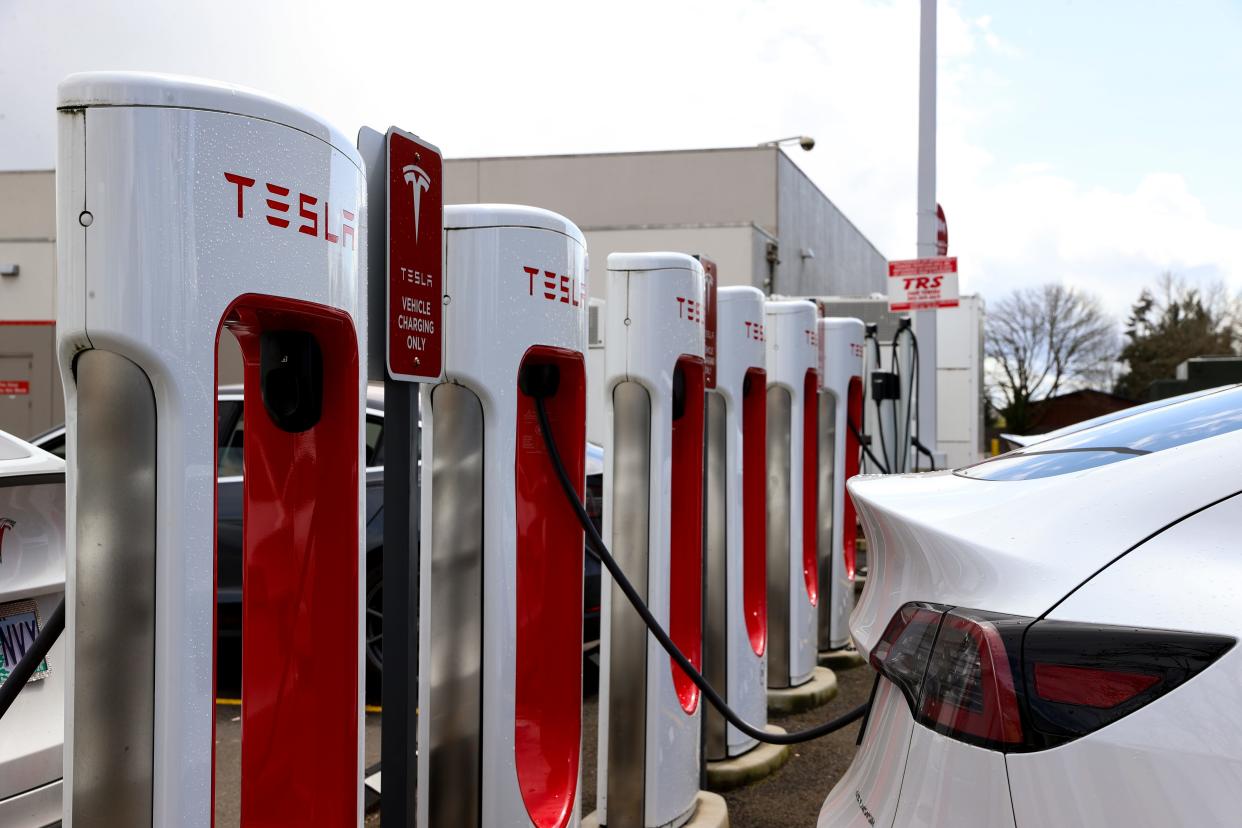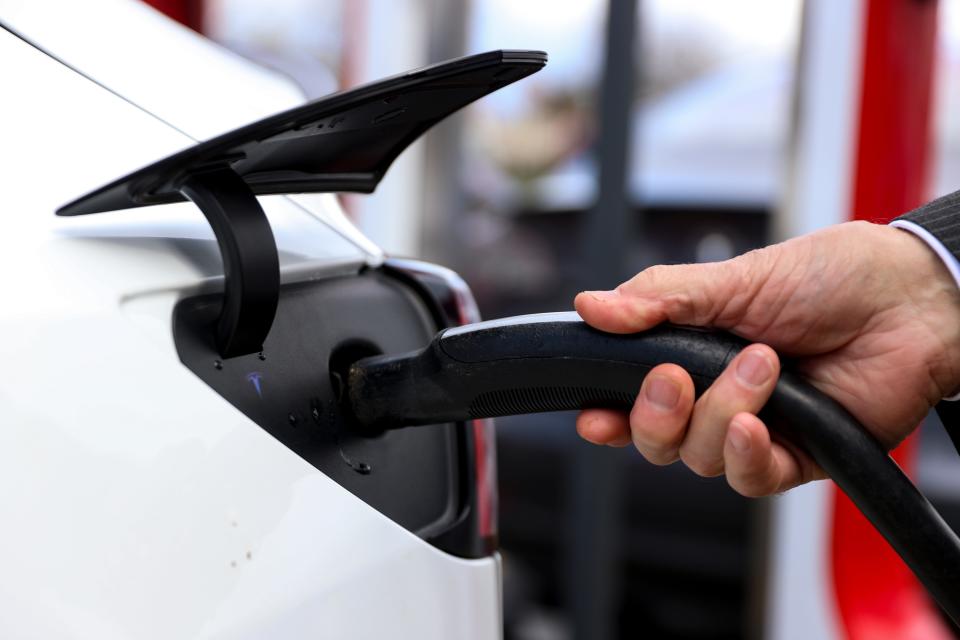Untangling when Oregonians are eligible for the state's electric vehicle rebate

The Oregon Clean Vehicle Rebate program closed in May 2023 when it ran out of funding and reopened this spring for just two months, ending June 3, based on funding estimates.
But so many people already have applied for the rebates this spring that funding is likely to be exhausted ahead of the June deadline.
Oregonians who purchased an EV during the two-month window, however, still might be able to get a refund if taxes collected by Oregon dealerships are higher than expected.
"We sold double-triple the number of new EVs during the rebate program times so it did have a big effect," said Brian Schindler, director of business development at Capitol Auto Group in Salem.
"EVs are coming around to the mainstream buyer and mainly due to the credits and rebates," Schindler said.
He said the state rebates that range from $2,500 with a standard rebate to $7,500 for low to moderate-income Oregonians have allowed dealerships to advertise and offer special leases and deals that prior to the rebates were not available. Before the rebates, Schindler said, Capitol Auto Group did not sell many EVs.
More than 16% of all new vehicle sales in Oregon were electric vehicles in the first quarter of 2023, the second-highest rate in the nation, according to the Oregon Department of Energy. And according to its EV dashboard, 84,865 total zero-emission vehicles were in Oregon as of December 2023.
Due to the surging sales last year and depleted rebate funds, Oregon’s Department of Environmental Quality paused the program for the first time since it began in 2018, closing the program on May 1, 2023.
“We understand the short windows of time when our program is open can be challenging for folks,” said Erica Timm, Oregon Clean Vehicle Rebate coordinator at DEQ.
Even if they missed out on the Oregon rebate, buyers purchasing or leasing a new, eligible electric vehicle could get a $7,500 federal tax credit. The federal tax credit also directs $4,000 for eligible used electric vehicles.
More than 20,000 EV buyers miss out on Oregon rebate
According to the Oregon Department of Transportation, 21,557 new electric vehicles were registered from May 2023 through February 2024. The registrations for those vehicles represented an average of 14.5% of total brand-new vehicle registrations.
But those buyers and anyone buying an EV through April 3 this year were not eligible to receive the Oregon Clean Vehicle rebates.
Harold Gailey, of Redmond, purchased a Hyundai Ioniq 6 in Salem shortly before 2024's window was announced, assuming funding would be available in January not April.
Gailey said he was frustrated when he realized his purchase wouldn't be eligible for the rebates and described the limited window as "capricious and arbitrary."
He said he doesn't regret his purchase but wanted to understand why DEQ's funding window this year could not apply to buyers outside of the two months DEQ announced this year.
How much money does Oregon's EV rebate program have this year?
Oregon funds its Clean Vehicle Rebate program through the state's vehicle privilege tax of 0.5% of the retail price of the vehicle collected by Oregon dealerships and paid quarterly to the state.
The program has base funding of $12 million a year, or 45% of the tax. It can be more if taxes exceed $12 million.
Funds from the state are sent in two disbursements, usually in early March and mid-May. If tax collections were more than $12 million there is an additional disbursement in the last quarter of the year.
In 2023, DEQ received a total of $15,395,232 among three disbursements and about $3.5 million in carryover funds from 2022, the agency said.
This year the first 2024 budget disbursement was received in early March.

The agency first paid out $2.5 million in rebates to 560 approved applicants on a waitlist after purchasing or leasing EVs before the program closed last year.
It also directs $1.2 million for administrative costs and another $300,000 for public engagement. The agency pays Thuy Tu Consulting $200,000 to increase awareness of the Charge Ahead Rebate program through community-based organizations.
DEQ is required to use 20% of rebate funds for Charge Ahead rebates. Another $100,000 of the $300,000 goes to the Center for Sustainable Energy, for training and awareness among dealerships. The Center for Sustainable Energy also is the national nonprofit DEQ contacts with to process all rebate applications and distribute the rebates.
A final $100,000 is held over for the following year for administrative costs until spring disbursements are received, DEQ said. (DEQ has a 10% cap on administrative costs in its rules).
That means there is only $7.9 million available for EV rebates this year.
Timm said DEQ has applied for an Environmental Protection Agency climate pollution reduction grant to fund a portion of the Charge Ahead Rebate program.
In the grant narrative submitted to the EPA, the agency states the funding need:
"The popularity of this program has greatly outpaced the $12 million annual funding, leading to the program being open for only 5 months in 2023 and just 2 months are projected for 2024. Future suspensions are anticipated with even shorter program availability. This results in fewer low-income households being able to afford cleaner transportation choices," DEQ wrote.
If funded, that money would likely be available in 2025 for rebates and hopefully, the program will be open longer for that part of the rebate program, Timm said.
How Oregon decided to close the program last year, reopen for 2 months this year
Timm said DEQ closed the rebate program last year after determining the time they thought the program would be able to pay out rebates.
“If we were to leave the program open and allow vehicles purchased while we were on suspension to also be eligible for the rebate, we would be dipping into future year funds to pay out those rebates and wouldn't be able to open in future years,” she said.
If rebates had been available all of 2023, there wouldn't have been any money for rebates this year, Timm said.
“It’s possible the vehicle privilege tax will again provide more funding, but we won’t know that until the last quarter of 2024," said DEQ spokesperson Susan Mills. "If that’s the case, we will use that final disbursement to pay as many approved rebates as possible on the 2024 waiting list.”
But once funding is depleted, said Mills, the rest of the waiting list will have to wait until early spring 2025 when the agency receives that year’s initial funding disbursement.
How EV buyers, dealers can stay up to date on rebate funding
DEQ updates available rebate funding on its website throughout the year to give applicants a better idea of how much funding is left.
As of May 13, $1.04 million of funding remained and more than $4 million in applications were in queue.
Applications for vehicles purchased before the June 2 deadline will be processed in the order they are received, DEQ said. If funds run out before qualified rebates can be paid out, they will be placed on 2025's waitlist and prioritized when funds are replenished in early spring 2025.
Oregon's EV rebate amounts
Oregon's Clean Vehicle Rebate can be taken directly off the cost of a purchased or leased electric vehicle from a participating dealership.
For electric vehicles leased or purchased from a non-participating dealership, buyers have to apply online after possessing their vehicle and wait about two to three months to receive the rebate. Applications have to be submitted within six months of when buyers take possession of their EV.
The standard rebate is $750 for zero-emission motorcycles, $1,500 for vehicles with a battery under 10kWh, and $2,500 for vehicles with a battery of 10kWh and over.
The Charge Ahead Rebate is income-limited, providing a higher rebate for low to moderate-income Oregonians purchasing new or used electric vehicles. Applicants must have a total household income below 400% of the federal poverty guideline, which is slightly above $60,000 for a single person and nearly $124,000 in four-person households.
Last year, DEQ launched a prequalification application for the Charge Ahead Rebate, allowing potential buyers to know if they would qualify. The program provides a $6,500 rebase for new vehicles with a battery under 10kWh, and a $7,500 rebate for new vehicles with a battery of 10kWh or more. For a used electric vehicle the Charge Ahead rebate is $5,000.
Visit the DEQ site for additional details.
Dianne Lugo covers the Oregon Legislature and equity issues. Reach her at dlugo@statesmanjournal.com or on X @DianneLugo
This article originally appeared on Salem Statesman Journal: Oregon's electric vehicle rebate program only open 2 months

